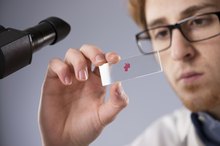Foods High in Lithium
Lithium — from the Greek word lithos, which means "stone" — is a silver-white chemical element that belongs to the alkali metal group in the periodic table. It has numerous industrial and commercial applications, such as psychiatric drugs, heat-resistant glass, batteries and the alloy in aircraft. Interestingly, lithium is also present in foods. In normal doses, lithium does not have any perceivable toxic effect and might actually hold some physiological significance to living organisms.
Lithium Consumption
The U.S. Environmental Protection Agency, or EPA, estimates that the daily lithium consumption for a 154 lb. adult ranges from 650 to 3,100 micrograms, or mcg. A microgram is one-millionth of a gram. Due to the high lithium content within human embryos, scientists believe it might play an important role during early fetal development. It might also affect behavior and the central nervous system in some way. Without further studies, it's difficult to estimate dietary needs in humans. Provisionally, the recommended dietary allowance is 1,000 mcg per day.
- The U.S. Environmental Protection Agency, or EPA, estimates that the daily lithium consumption for a 154 lb.
- Without further studies, it's difficult to estimate dietary needs in humans.
Sources of Lithium
Natural Sources of Lithium
Learn More
Trace amounts of lithium exist naturally within the soil and ground water. Plants readily absorb lithium by taking it up through the roots from mineral-rich waters, though it does not seem to be necessary for the growth and development of the organism. From there, it enters the rest of the food chain. Lithium does not exist in its "free" form. Instead, it is joined with various water-soluble salts. This is the form in which it appears within the tissue of animals and plants.
- Trace amounts of lithium exist naturally within the soil and ground water.
- Plants readily absorb lithium by taking it up through the roots from mineral-rich waters, though it does not seem to be necessary for the growth and development of the organism.
Daily Intake
The primary source of lithium in the diet is grains and vegetables, which contribute between 66 to 90 percent of the total daily intake. Animal-derived foods represent the remainder of your food intake. When it comes to beverages, water also contains high levels of lithium. In some parts of Texas, tap water can contain up to 170 mcg per quart.
- The primary source of lithium in the diet is grains and vegetables, which contribute between 66 to 90 percent of the total daily intake.
Foods
Side Effects of Limu
Learn More
The precise amount you eat depends largely on the lithium content in the soil, which can vary widely between different countries and regions. For example, the ground water of northern Chile is particularly lithium rich. However, some plants have a greater propensity for absorbing lithium. Nightshade plants such as peppers, potatoes and tomatoes demonstrate a remarkable tolerance to lithium and can reach a lithium content of up to 1,000 mcg per gram. Eggs, milk and any foods made from grains also appear to have high lithium content.
- The precise amount you eat depends largely on the lithium content in the soil, which can vary widely between different countries and regions.
- However, some plants have a greater propensity for absorbing lithium.
Related Articles
References
- Journal of the American College of Nutrition: Lithium--Occurrence, Dietary Intakes, Nutritional Essentiality
- ENC Labs: Some Facts about Lithium
- Chiu CT, Wang Z, Hunsberger JG, Chuang DM. Therapeutic potential of mood stabilizers lithium and valproic acid: beyond bipolar disorder. Pharmacol Rev. 2013;65(1):105-42. doi:10.1124/pr.111.005512
- Alda M. Lithium in the treatment of bipolar disorder: pharmacology and pharmacogenetics. Mol Psychiatry. 2015;20(6):661-70. doi:10.1038/mp.2015.4
- Rybakowski JK. Challenging the Negative Perception of Lithium and Optimizing Its Long-Term Administration. Front Mol Neurosci. 2018;11:349. doi:10.3389/fnmol.2018.00349
- US National Library of Medicine. Lithium toxicity. Updated October 2017.
- De fazio P, Gaetano R, Caroleo M, et al. Lithium in late-life mania: a systematic review. Neuropsychiatr Dis Treat. 2017;13:755-766. doi:10.2147/NDT.S126708
- De fazio P, Gaetano R, Caroleo M, et al. Lithium in late-life mania: a systematic review. Neuropsychiatr Dis Treat. 2017;13:755-766. doi:10.2147/NDT.S126708
- Gershon, S. Lithium: discovered, forgotten and rediscovered. International Network for the History of Neuropsychopharmacology. August 15, 2013.
- Sani G, Perugi G, Tondo L. Treatment of bipolar disorder in a lifetime perspective: is lithium still the best choice?. Clin Drug Investig. 2017;37(8):713-727. doi:10.1007/s40261-017-0531-2
- Shorter E. The history of lithium therapy. Bipolar Disord. 2009;11 Suppl 2:4-9. doi:10.1111/j.1399-5618.2009.00706.x









